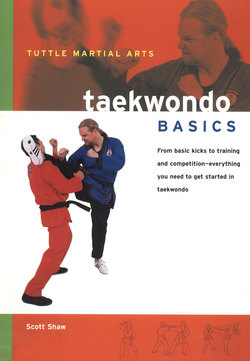Читать книгу Taekwondo Basics - Scott Shaw - Страница 12
На сайте Литреса книга снята с продажи.
ОглавлениеCHOOSING THE RIGHT SCHOOL of taekwondo is essential if you are to maintain an ongoing interest in the art, while continuing to grow as a human being. Therefore, your enrollment in a school should never be taken lightly.
It is important to understand that what is right for one person is not necessarily right for another person. If somebody tells you that he or she attends the best taekwondo school on the planet, that does not mean it is the right studio for you.
Choosing a school of taekwondo must be done scientifically. You must study all of the elements of the school and then make a conscious decision about whether or not it is the right place for you to train.
Ten Questions
The most important thing you can do before you choose a school of taekwondo is to go and watch a class at the studio you are considering attending. As you do, ask yourself these questions:
1. Is the school teaching what I want to learn?
2. Are the classes taught in a manner that will be beneficial to me?
3. Does the senior instructor teach the class, or does he have his students teach the class?
4. Are the beginning students treated with respect?
5. Are the white belts (beginners) at the school left to learn the techniques completely on their own, or are there advanced students helping them on their way?
6. How long has the school been in business?
7. Is the school affiliated with a large taekwondo governing body, or is it teaching an independent style?
8. Is the school's primary focus on self-defense or competition?
9. What are the belt promotion standards for the school (how long does it take to advance between belts, and what is the price of promotion)?
10. Do I have to sign a contract when I join the school, or are payments made on a month-to-month basis?
The Hype
When you go to watch a class for the first time, you will probably be given the hard sell by the instructor or one of the senior members of the school. They will usually attempt to convince you that their school is the best in the area, and that all other schools are not up to their level of expertise. This is a very common practice, so it is essential that you do not allow yourself to be drawn into a school that you do not truly wish to attend.
Some schools allow you to take a free introductory class. This is an exceptional way to decide if a school is right for you. With a free class you get to actually experience a school's method of training.
The Instructor
An obvious selling method in taekwondo is for an instructor to list all of his accomplishments. A taekwondo instructor's credentials are, obviously, an essential element in making your decision about where you will train. Accomplishments, however, do not necessarily mean that a particular taekwondo instructor is a dedicated teacher or the right instructor for you. Just because an instructor tells you that he is a "World Champion," "Ninth-Degree Black Belt," "Supreme Grand Master," or "Olympic Coach," don't assume that he is a competent instructor. When seeking out a school of taekwondo, you must weigh the instructor's accomplishments against his teaching ability.
It is essential to keep in mind that many taekwondo instructors have relocated from South Korea. Taekwondo training in South Korea is vastly different from what one commonly experiences in the West. It is much more intense. For example, the average Western student would not appreciate being struck with a bamboo shaft when he performs a technique incorrectly. This, however, is a very common occurrence in the schools of taekwondo in South Korea. Some teachers bring this training method with them, so you must find a school where the instructor meets your specific training needs. The only way to do this is to observe the class.
The Contract
Schools of taekwondo are martial arts businesses. In recent years it has become a common practice for schools to require new students to sign contracts. These contracts cover a prescribed period of time—anywhere from three months to three years.
Commonly, the longer you sign up for, the less your monthly payments. Although this sounds good, it does have a downside.
The student contracts presented at a martial arts studio normally specify that you must pay your monthly membership fee whether you attend classes or not. If you spend a few weeks at the school, discover that you hate it, and quit, you will still be responsible for paying the monthly fee until your contract has expired.
Ideally, before entering into any contract, you may want to sign up for a month to get a clear picture of what the school's training program actually entails and to see how much progress you make in that time. If the school management refuses to let you do this, it will give you a clearer idea of the school's motivation—money, as opposed to true taekwondo training.
